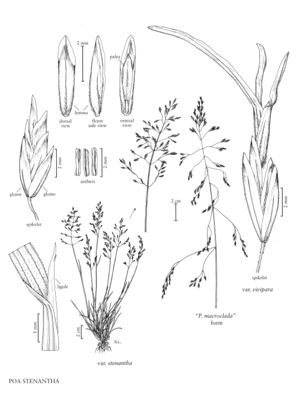familyPoaceae
subfamilyPoaceae subfam. Pooideae
tribePoaceae tribe Poeae
genusPoa
subgenusPoa subg. Poa
sectionPoa sect. Secundae
subsectionPoa subsect. Halophytae
speciesPoa stenantha
varietyPoa stenantha var. stenantha
Difference between revisions of "Poa stenantha var. stenantha"
Treatment appears in FNA Volume 24. Treatment on page 594.
imported>Volume Importer |
imported>Volume Importer |
||
| Line 34: | Line 34: | ||
|publication year= | |publication year= | ||
|special status= | |special status= | ||
| − | |source xml=https://bitbucket.org/aafc-mbb/fna-data-curation/src/ | + | |source xml=https://bitbucket.org/aafc-mbb/fna-data-curation/src/200273ad09963decb8fc72550212de541d86569d/coarse_grained_fna_xml/V24/V24_836.xml |
|subfamily=Poaceae subfam. Pooideae | |subfamily=Poaceae subfam. Pooideae | ||
|tribe=Poaceae tribe Poeae | |tribe=Poaceae tribe Poeae | ||
Latest revision as of 17:25, 11 May 2021
Spikelets not bulbiferous; florets normal. Anthers 1.2-2 mm.
Discussion
Poa stenantha var. stenantha can be difficult to separate from P. secunda subsp. secunda (p. 588). Its main distinguishing features are its strongly keeled lemmas with glabrous intercostal regions, and, when present, callus hairs longer than 0.2 mm. Plants with large panicles and glabrous calluses have been called P. macroclada Rydb. Such plants grow infrequently in the U.S. Rocky Mountain portion of the species' range. They intergrade with the more compact typical form.
Selected References
None.
Lower Taxa
None.
... more about "Poa stenantha var. stenantha"
